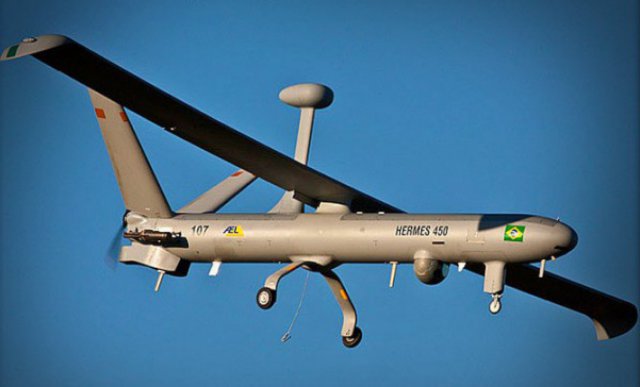 With the World Cup and Olympics arriving, tough security plans are being overseen by the Brazilian Air Force. Nationwide protests have provided yet another “event” to be monitored.
With the World Cup and Olympics arriving, tough security plans are being overseen by the Brazilian Air Force. Nationwide protests have provided yet another “event” to be monitored.
The opening game for the FIFA Confederations Cup in Brasilia last Saturday set in motion a huge security plan, driven above all by the Brazilian armed forces.
While hundreds of demonstrators were being constrained near the Mané Garrincha Stadium shortly before the Brazil-Japan match, Israeli-made unmanned aircraft and helicopters were filming the land and sky in real time. The events were followed live from the National Command and Control Centre.
That day, a controversial measure came into effect: the temporary closing down of Brazilian air space. This means the Brazilian Air Force has the prerogative to shoot down suspicious aircraft without prerequisite presidential permission.
In peacetime, it has generally prohibited taking down “enemy” objects without prior authorization by the head of state. The new “license” granted to the Brazilian air force gives it autonomy one hour before and four hours after the Confederations Cup matches. This suggests that the security blueprint of the international soccer Confederations Cup was designed as a trial run for the 2014 FIFA World Cup, Pope Francis’s visit this summer during the Catholic World Youth Day Festival, and the 2016 Olympic Games.
The state-of-the-art surveillance and military equipment comes from abroad: the unmanned drones were purchased from Israel, the tanks from Germany, and the anti-aircraft defense system comes from Russia.
But there has been an unexpected twist since protests began across Brazil two weeks ago against public transportation fee hikes and the massive spending for the international sporting events. Part of the arsenal, which includes helicopters with cameras, was used this past week in Brasilia and Rio de Janeiro – two Confederations Cup venues — to film the hundreds of Brazilian “troublemakers” who came to the stadiums to protest the federal government’s over-spending on international sports events.
The security coordination centers, which monitor each of the six cities hosting the Confederations Cup, collected images of the protests. With these, the police troops were then able to suppress potential “suspicious” groups with rubber bullets and tear gas wherever they were forming.
Monitoring “suspects” from on high
On May 29, after the Brazilian air force revealed it had been granted autonomy to intercept “hostile” objects, it clarified right away that this would not imply risks for the public. “The drone flights over the stadiums pose no risk to the spectators. And we will not always be positioned over the crowd, but will be in nearby areas where it is possible to watch the surroundings and obtain the pictures we are interested in,” said Colonel Donald Gramkow, commander of the air force squadron that operates the UAS.
The drones are equipped with cameras, radars and sensors to “X-ray” the surveillance area and the movement of “suspect” people and vehicles.
The security blueprint includes the creation of a new organization: the Center for Prevention and Combating Terrorism, which operates under the army’s responsibility. That is where they decide which troops should operate in the different stadiums according to how the matches develop. These are the troops that went into action on Saturday in Brasilia and the ones that acted on Sunday in Rio de Janeiro.
President Dilma Rousseff, who endured incessant booing alongside FIFA president Joseph Blatter last Saturday, recently justified the concentration of repressive power in the army’s hands during large sporting or religious events. She sustained that “the federal government has the obligation to act on the issues that are under its responsibility.” This approach was formalized through an agreement between the Ministries of Defense and Justice. It granted the army, navy, and the air force the responsibility for counter-terrorism activities. The army was assigned the task of suppressing any attacks while the federal police was assigned intelligence.
Finally, the provincial police is there for the control of the common mortals who just want to enjoy the games. But the dividing line between civic protests, like yesterday’s around the Maracana, and potentially terrorist ones is unclear. In any case, everything seems to indicate that Rousseff did not imagine there would be public protests during the Cup.
Source: WorldCrunch
